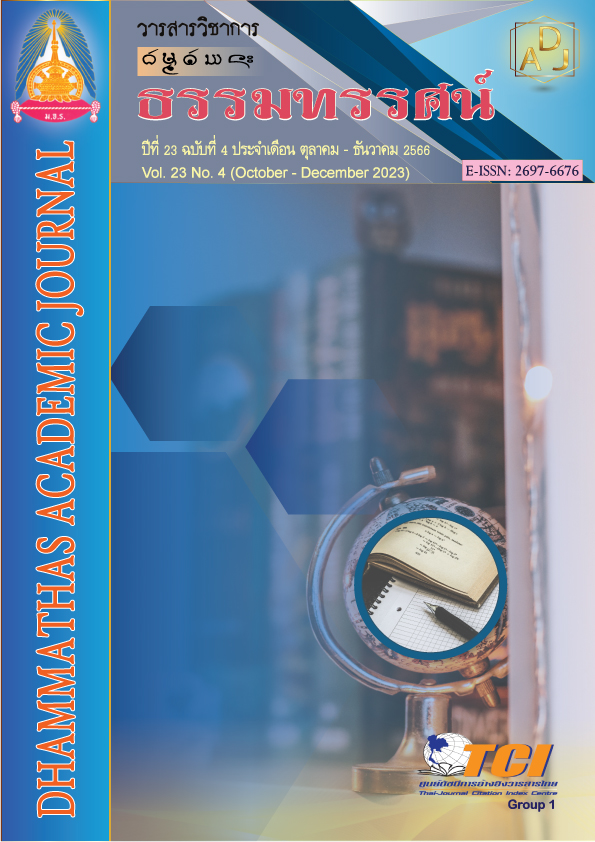The Multi-level Factors Affecting the Public Mind of Students in Primary Schools under the Offices of Primary Educational Service Area in the Northeast of Thailand
Main Article Content
Abstract
The purpose of this research are to 1) study the students’ public mind level in Primary Schools under the Offices of Primary Educational Service Area in the Northeast of Thailand, 2) study the student-level, class-level and school-level factors that affect the students’ public mind and 3) construct a multi-level model of factors affecting students’ public mind. This research is quantitative research. The sample comprises 48 administrators, 96 teachers and 1,440 students selected through multi-stage sampling. The research instruments are questionnaires, and data analysis uses percentage, mean, and standard deviation. The multi-level model is analyzed using HLM8.2.
The research results find that:
1. The public mind of students under the Offices of Primary Educational Service Area in the Northeast of Thailand is at the highest level.
2. Regarding student factors find that the parenting of parents, the attitude toward public mind, and the perceived self-efficacy affecting the students’ public mind are statistically significant at the .01 level, while social support is statistically significant at the .05 level. Regarding classroom factors find that teachers’ behavior, the learning and teaching environment, the teaching quality by the teachers, and the relationship between teachers and students affected the students’ public mind at the .05 level of statistical significance. With regard to school factors find that school support significantly affected the students’ public mind at the .01 level.
3. The multi-level model of factors affecting the students’ public mind is illustrated below:
PUBLIC = 4.606 + 0.156PARE*CLIM + 0.117ATTI*CLIM
+ 0.400ATTI*BEHA + 0.385ATTI*TEACH + 0.540CAPA*BEHA
+ 0.531CAPA*TEACH + 0.077SUPP + 0.157BEHA + 0.076ENVI
+ 0.161TEACH + 0.78RELA + 0.261PARE + 0.245ATTI
+ 0.063CAPA + 0.070SOCI
Article Details

This work is licensed under a Creative Commons Attribution-NonCommercial-NoDerivatives 4.0 International License.
เพื่อให้เป็นไปตามกฎหมายลิขสิทธิ์ ผู้นิพนธ์ทุกท่านต้องลงลายมือชื่อในแบบฟอร์มใบมอบลิขสิทธิ์บทความ ให้แก่วารสารฯ พร้อมกับบทความต้นฉบับที่ได้แก้ไขครั้งสุดท้าย นอกจากนี้ ผู้นิพนธ์ทุกท่านต้องยืนยันว่าบทความ ต้นฉบับที่ส่งมาตีพิมพ์นั้น ได้ส่งมาตีพิมพ์เฉพาะในวารสาร วิชาการธรรม ทรรศน์ เพียงแห่งเดียวเท่านั้น หากมีการใช้ ภาพหรือตารางของผู้นิพนธ์อื่นที่ปรากฏในสิ่งตีพิมพ์อื่นมาแล้ว ผู้นิพนธ์ต้องขออนุญาตเจ้าของลิขสิทธิ์ก่อน พร้อมทั้ง แสดงหนังสือที่ได้รับการยินยอมต่อบรรณาธิการ ก่อนที่บทความจะได้รับการตีพิมพ์References
จิราภรณ์ กองเงิน. (2561). ปัจจัยพหุระดับที่ส่งผลต่อการมีจิตสาธารณะของนักเรียนระดับชั้นมัธยมศึกษาปีที่ 1 สังกัดสำนักงานเขตพื้นที่การศึกษามัธยมศึกษา เขต 36. วารสารบัณฑิตศึกษา มหาวิทยาลัยราชภัฏเชียงราย, 11(1), 55-67.
ชัยวัฒน์ สุทธิรัตน์. (2561). สอนเด็กให้มีจิตสาธารณะ. กรุงเทพฯ: วีพริ๊นท์.
ติณณพัชช์ พูลพิพัฒน์. (2564). สถานการณ์คุณธรรมในช่วงโควิด -19. กรุงเทพฯ: ศูนย์คุณธรรม (องค์การมหาชน).
นพพล ยอดกลาง. (2557). ศึกษาคุณลักษณะด้านจิตสาธารณะของนักศึกษามหาวิทยาลัยราชภัฏมหาสารคาม. (วิทยานิพนธ์ครุศาสตรมหาบัณฑิต). มหาสารคาม: มหาวิทยาลัยราชภัฏมหาสารคาม.
บัวชมภู ภูกองไชย. (2558). ปัจจัยที่ส่งผลต่อจิตสาธารณะของนักเรียนชั้นประถมศึกษาตอนปลาย สังกัดสำนักงานเขตพื้นที่การศึกษาประถมศึกษาบึงกาฬ. (วิทยานิพนธ์ครุศาสตรมหาบัณฑิต). มหาสารคาม: มหาวิทยาลัยราชภัฏมหาสารคาม.
ปรีชา คำมาดี และประสพชัย พสุนนท์. (2559). ปัจจัยที่ส่งผลต่อการมีจิตสาธารณะของนักศึกษาระดับอุดมศึกษาในจังหวัดระยอง. วารสารวิจัยรำไพพรรณี, 10(1), 70-79.
ปารณีญ์ ขวัญกิจวงศ์ธร. (2559). ตัวแปรที่ส่งผลต่อประสิทธิภาพการสอนของครูโรงเรียนมัธยมศึกษา สังกัดสำนักงานเขตพื้นที่การศึกษามัธยมศึกษา เขต 10. วารสารครุศาสตรอุตสาหกรรม, 14(3), 452-459.
ภัทรวดี กลีบสุวรรณ์. (2561). ปัจจัยที่ส่งผลต่อพฤติกรรมจิตสาธารณะของนักศึกษามหาวิทยาลัยศิลปากร วิทยาเขตสารสนเทศเพชรบุรี. (วิทยานิพนธ์ศึกษาศาสตรมหาบัณฑิต). กรุงเทพฯ: มหาวิทยาลัยศิลปากร.
ภูมิพิพัฒน์ รักพรมงคล. (2557). ปัจจัยเชิงสาเหตุที่ส่งผลต่อพฤติกรรมจิตสาธารณะของนักศึกษามหาวิทยาลัยราชภัฏในประเทศไทย. วารสารวิชาการศรีปทุม ชลบุรี, 11(1), 34–40.
ยุรฉัตร เดชสมอดี. (2559). ปัจจัยที่มีอิทธิพลต่อคุณลักษณะด้านจิตสาธารณะของนักเรียนชั้นประถมศึกษาปีที่ 6 สังกัดสำนักงานเขตพื้นที่การศึกษาประถมศึกษาอุดรธานี เขต 2. (วิทยานิพนธ์ครุศาสตรมหาบัณฑิต). มหาสารคาม: มหาวิทยาลัยราชภัฏมหาสารคาม.
สำนักงานเลขาธิการสภาการศึกษา. (2560). แผนการศึกษาแห่งชาติ พ.ศ. 2560-2579. กรุงเทพฯ: สำนักงานเลขาธิการสภาการศึกษา กระทรวงศึกษาธิการ.
หทัยรัตน์ อ่วมน้อย และคณะ. (2559). ปัจจัยด้านจิตลักษณะและด้านสภาพแวดล้อมที่เกี่ยวข้องกับพฤติกรรมการมีจิตอาสาของนักเรียนระดับมัธยมศึกษาตอนปลายในเขตจังหวัดปทุมธานี. วารสารวไลยอลงกรณ์ปริทัศน์ (มนุษยศาสตร์และสังคมศาสตร์), 6(3), 1-14.
Bierhoff, H. W. (2002). Just world, social responsibility, and helping behavior. Cambridge: Cambridge University Press.
Fiedler, F. E., & Chemers, M. M. (1974). Leadership and effectiveness management. Glenview: Scott, Foresman.

